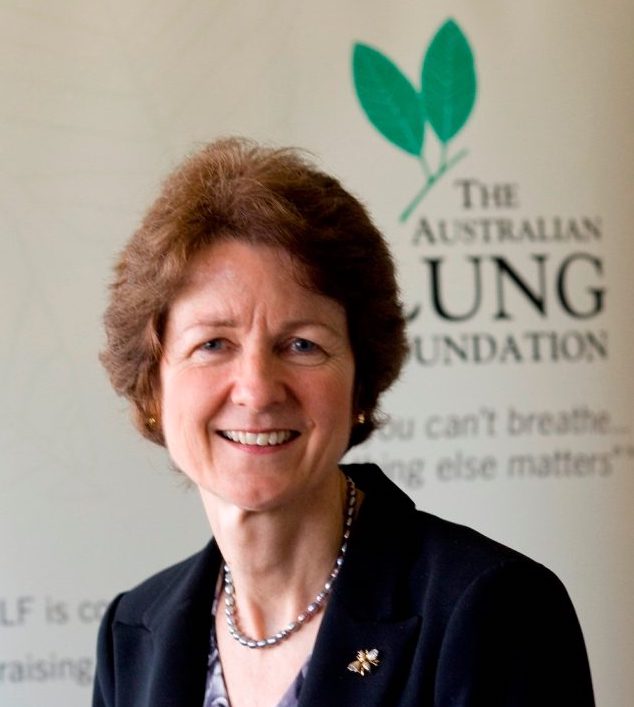Honour for Professor Christine Jenkins
 Professor Christine Jenkins AM has been awarded both the Governor-General Medallion for service to Lung Foundation Australia (LFA) and Life Governorship of the charity.
Professor Christine Jenkins AM has been awarded both the Governor-General Medallion for service to Lung Foundation Australia (LFA) and Life Governorship of the charity.
She is only the sixth Life Governor of LFA.
Professor Jenkins has led LFA as Chairperson for seven years during which it has achieved many long-term objectives including launch of the National Strategic Action Plan for Lung Conditions and the Lung Cancer Blueprint.
Professor Jenkins is a well-respected expert in respiratory medicine, particularly in COPD and asthma.
She is Head of the Respiratory Group at The George Institute for Global Health, Clinical Professor and Head of Respiratory Discipline at University of Sydney; and Professor of Respiratory Medicine at UNSW Sydney.
She has contributed widely to advocacy, clinical trials, government inquiries, guideline development and implementation to help improve clinical outcomes in airway disease.
The Governor-General’s Medallion is bestowed by Patron His Excellency General the Honourable David Hurley AC DSC and recognises significant contributions to charities during the 2020 and 2021 pandemic years.
Decision making on morphine for breathlessness
Functional rather than symptomatic improvement is the greatest influence on the decision to take regular, low-dose, sustained-release oral morphine for chronic breathlessness associated with COPD, Australian research shows.
Qualitative interviews at the end of a morphine dose increment RCT found even small gains such as the ability to climb stairs or walk to the letterbox had a positive impact on both patients and their caregivers.
Other benefits included breathlessness improvement, increased mobility and improved sleep at night.
Most participants were aware that morphine was a painkiller but had never heard about its potential role in breathlessness. Few patients were concerned with addiction or associated morphine with end of life before participating in the trial.
Constipation was the only harm reported by participants and lead to some to discontinue the morphine despite being given blinded laxatives during the trial. Sedation and nausea were not reported.
“Overwhelmingly, participants reported that regular, low-dose, sustained-release morphine was easy to take and therefore not an obstacle to therapy continuation,” said researchers from the University of Wollongong.
Read more in BMJ Open Respiratory Research
Ventilator patients ignored by power company
Energy Australia has been fined $12 million after being found guilty of failing to register patients using medical devices such as ventilators that require constant power.
The fine, handed down last week, comes after the company admitted to not notifying distributers as soon as possible when advised that over 4,000 customers used life support equipment between 2018 and 2020.
It was the largest penalty ever imposed for breaches of the national energy retail law, which requires vendors to register customers with devices including ventilators, oxygen concentrators, dialysis machines and CPAP among others
EnergyAustralia said it “did not have adequate systems, policies and procedures to fully comply with the life-support rules” during the period in question.
The company added it reported the breaches itself after an internal investigation and had not found any instances where customers had their power wrongfully disconnected as a result.
“We have fundamentally redesigned how we manage life support obligations, and since early 2020, have processes that record life support registrations and automatically notify distributors upon customer notification,” a spokesperson said.